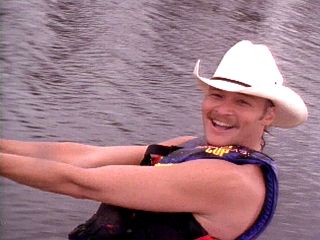
This offering from Alan Jackson is a bit different than most of the ones I've focused on so far. The song itself is not so awful, especially when compared to other singles Alan Jackson released from the same album, for example. No, "Drive (For Daddy Gene)" is a relatively forgettable Contemporary Popular Country song focusing on that time-tested subject of motor vehicles.
(Although, I do have to note that I did grow up in a more rural area than the one where I currently live, and I do know of some parents who would allow their children to take the wheel on occasion because this is cute or something? To me, it seems more irresponsible and terrifying. But, that's just me.)
So if the song itself isn't what's so awful about this single, what can be the factor that is driving this song from bad to intolerable? The nonsense that was slapped together that is supposed to pass as a music video, that's what.
The concept here is pretty straight forward. Alan Jackson is recalling the instances where his father allowed him to operate a boat and a truck, and these memories are brought to life like literal pictures in a dusty old book springing to life. The problem is, that the "pictures" are animated incredibly cheaply and it's just awkward to watch. Just take a look at the young Alan Jackson in the Mario Andretti car at around 2:23 in the video. That's really the best they could scare up for one of CPC's top stars? I am willing to wager that, given a reasonable amount of time, I could have done better than that, and believe me when I tell you that an artist I am not. Seriously, though, that is just awful. And the boat at 1:17 isn't much better.
The thing is, this level of quality of computer animation could be forgiven if this had been released in, say, the early to mid 1990's. But it wasn't. "Drive (For Daddy Gene)" was released as a single in 2002. 2002. Computer animation had already been revolutionized by Toy Story in 1995. That means that the better part of a decade had elapsed since the world at large started taking serious notice of computer animation, and when this video was released. It would be unfair of me to expect a high-quality output from a team assembling a music video (which is hardly going to be as high-budget and quality-oriented as Pixar) if it had been the next year. But nearly a decade later? There is no excuse for this low quality.
And that is how it came to pass that an unremarkable song earned its place here amongst all the other royally crappy songs.
I would like to add, though, that it is really brave of Alan Jackson to continue sporting the mustache and mullet in 2002 in the face of good taste. That man has a story about his looks, and he's sticking to it. And I, for one, applaud him.




